 |
Ramayan |
 |
 |
Ramayan |
 |
|
|
Home | Hanuman Chalisa | Kuber Temple |
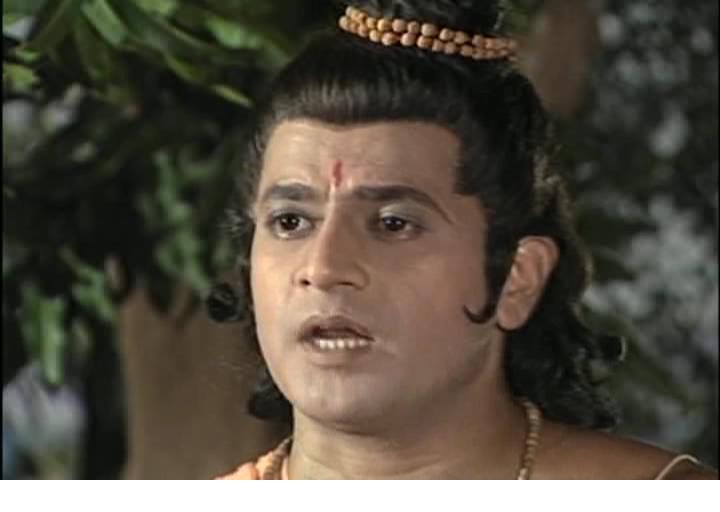
Ramayan Story OF LORD SREE RAMA In the era of Treta Yuga, king Dasharatha of the dynasty of Ikshwakas was ruling northern India with Ayodhya as his capital. He was married to three queens – Kausalya, Sumitra and Kikeyi- but none of them bore any children for him. Desperate for an heir, the king consulted his guru who advised him to perform the Putra Kameshti Yajna. Dasharatha performed the yajna with the help of the sages, priests and gurus as prescribed in the Vedas. The gods were pleased by his yajna and a divine being came out of the yajna fire and offered the king a vessel of prasadam. The divine being told the king to distribute the prasadam equally among his three wives and they would soon bear sons who would be the incarnation of Lord Maha Vishnu Himself. 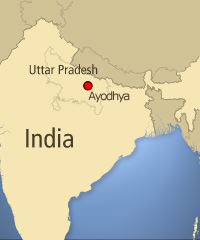 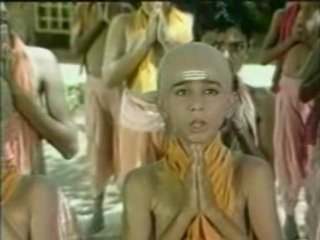
Ram completed their education under the Vashishtha
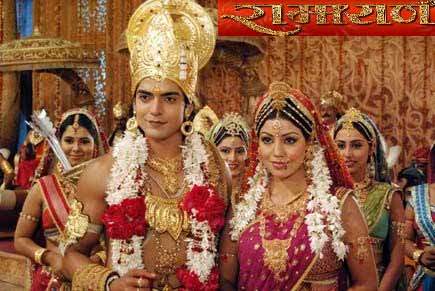
The ceremonial preparations were in full swing but Kaikeyi confined herself to a corner room in her quarters and refused to participate in the jovialities. Dasharatha noticed that her youngest queen was unhappy. He approached her lovingly and asked her why she was unhappy. Kaikeyi replied that she did not feel loved. She accused him of loving his other queens more than her. Dasharatha’s pleadings to the contrary went unheard. Finally he asked her what would make her feel happy and loved. She replied that if only he could deliver on the promise he had made to her sometime ago, she would be happy. Dasharatha had granted Kikeyi two wishes in appreciation of her help which secured his victory over his enemy in one of his many battles with his enemies. Dasharatha told her to claim her two wishes now and that he would not flinch no matter what she asked for. He did not quite fathom Kikeyi’s scheme for he never suspected any ill will or rivalry among his queens. Kikeyi seized the opportunity. She said, "I want Rama exiled to the forest for fourteen years as my first wish. For my second wish, I want my son Bharata made the king in place of Rama." Dasharatha was devastated. He could not bear the thought of exiling Rama to the forest. The very thought had made him numb. But he could not deny Kikeyi her wishes for that would mean that he did not keep his word. The dynasty of Ikshwakas was known for its fidelity and no one ever went back on a promise made. It had to be done. He conveyed Kikeyi’s wishes to Rama and his inability to deny her because of his prior promise to her. He also summoned Bharata who was in his maternal uncle’s town at that time to return immediately to Ayodhya. Rama readily agreed to his father’s wishes to exile him and to make Bharata the king of Ayodhya. It is a son’s duty to his father to obey him. Rama reassured his father that he was happy for Bharata and he wished him and Kikeyi well. Lakshmana and Sita learned of the king’s orders and were astounded. They both begged Rama to let them accompany Him to the forest, for they could not bear to imagine Rama alone in the forest. "Moreover," Sita said, "this palace is worse than a forest when you are absent and the forest will be my heaven if I am with you." Rama had to agree reluctantly for neither agreed to stay back however much he dissuaded them. 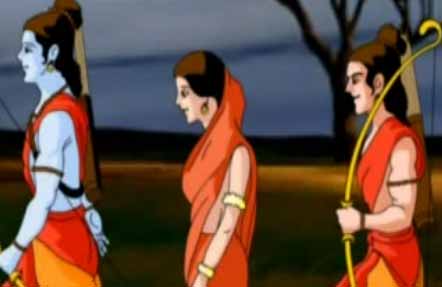 They came to the shores of the river Ganga and were helped by a boatman named Guha to cross it. From there they crossed the Chitrakoota mountain and continued south to reach the thick dense Dandaka forest. In that forest, in a place called Panchavati, they made themselves a small hut for their home. Time passed with difficulty. The princess Sita who used to sleep on the softest of beds, now slept on the hard floor. Instead of clothing made of silk laced with golden embroidery, she wore coarse clothes made of tree barks. The brothers also had to adopt their princely ways to the harsh realities of the forest. However, their love for each other kept them happy. Sita was ever eager to look after the comforts of Rama. Lakshmana was ever vigilant in guarding Rama and Sita from any danger. The forest was home for not just wild and cruel animals; it was also a hunting ground for cannibalistic asuras of all kinds who used their magical powers on unsuspecting humans. One day an asura lady, Shurpanakha, came upon the hut of Sita, Rama and Lakshmana while wandering about in the forest. She was mesmerized by the beauty of the princes and the princess. She was especially attracted to Rama whose handsome figure had made her lustful. She took on the form of a beautiful damsel and, approaching Rama asked him to take her as his mistress. Rama replied that He was married and can not think of consorting with any woman other than his wife. He was committed to practicing monogamy as his ideal. He directed her to Lakshmana who recognized her true demonic nature and cut off her nose and two ears with his sword. Shurpanakha left the human form and ran off crying in pain. She went to her brother Ravana in Lanka. There she described to Ravana Sita’s beauty and told him that all his wealth and power equals nothing if he did not possess Sita. It was true, she told Ravana, that he had in possession several hundred women taken from heaven and the three worlds that he had conquered, but their beauty compared to Sita’s was like a candle in front of the midday sun. She further enraged him with her words that the humans, Rama and Lakshmana, had insulted him who was the most powerful man in the three worlds by insulting her, his sister. For her sake, she goaded him, he should take revenge. Ravana was a proud king. Having done the most severe tapas, he had pleased Lord Shiva and obtained several boons from him. Empowered by the boon, he conquered all the three worlds and subdued all the kings. His capital city was beautiful and prosperous. There was nothing he could not conquer or possess. Besides, he hated the humans. And now the two of them living in the forest are making life miserable to all the asuras of his kind. It is time to teach those two lowly creatures a lesson. The humans believed that taking another man’s wife was a sin. For them sanctity of marriage was unbreakable. If Sita is half as beautiful as Shurpanakha had described her to him, she would be a prize in his possessions. What else would be a more painful insult than taking the man’s wife? Taking Sita away from Rama would insult Rama and enhance his prestige. He summoned his trusted lieutenants, Khara and Dooshana and sent them off on the mission to kill the two brothers living in the Dandaka forest and bring the lady Sita alive to him. These two asuras were very powerful and experts in magical warfare. They came to the place where Rama and Lakshmana were living and started a war. Rama and Lakshmana killed them both with their arrows along with the army they had brought with them. Ravana came to know of their deaths from the few survivors who fled the scene. It was obvious to him that these two are not to be engaged in a direct fight but a plan had to be devised to take Sita away from them. He called Maricha. Together, they hatched a plan to steal Sita away from Rama. 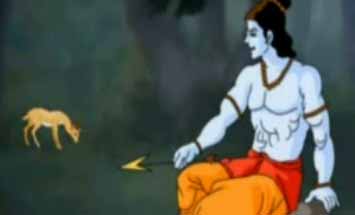 Rama realized that he had been deceived. He hurried back. But back at the hut, Sita and Lakshmana had heard the cry for help from what seemed to be Rama. Sita became anxious and distraught. Lakshmana tried to reassure her that no harm can come to Rama and that the cry for help probably was a trick from the asura. Lakshmana reasoned that this may be some kind of trick by one of the numerous asuras roaming in the forest. Sita could not be convinced. There was no harm in going for His help, she countered. Even if it turns out to be a hoax, what have they got to loose? She could take care of herself for the brief period he would be away. 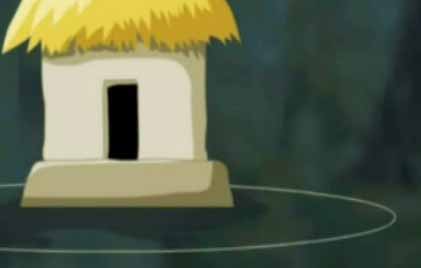 Sita was waiting anxiously looking towards the way Rama and Lakshmana went. Then there came a sage-like looking man to her hut and said, "Mother, I come to ask you for some food." It was not unusual for forest dwelling munis and monks to live on alms. Sita thought that this man at the door of her hut deserved to be treated as a guest and given food. She offered him some food and asked him to step forward to receive it as it would mean that she would be crossing the line that Lakshmana drew for her protection if she stepped out to meet the stranger. The man insisted that she come out to the perimeter and serve it to him. Otherwise, he would walk away and the sin of turning a guest away would be hers. Sita could not deny the guest and turn him away. She stepped outside of the line to give the alms to the man but the sage-like looking man now turned in to a demon with ten heads and twenty arms. It was Ravana who came in the disguise of the sage. His plan to corner Sita alone had succeeded. Sita looking at his fierce dreadful form at once fainted. Ravana carried Sita to his airplane, Pushpaka, and started flying towards Lanka. When Rama met his brother Lakshmana, his suspicions grew. Sure, this was a trick played on them and now not only he but his brother also fell for it and had left Sita alone. They hurried back to the hut as fast as they could but it was too late. Sita was nowhere. The hut was empty. The food that Sita carried to Ravana lay strewn around at the gate. Rama called out for her as loud as He could, "Sitaaaa! Siiiiiitaaaaa!" The forest echoed back his calls and it seemed like the entire universe fell silent. They searched for her in every direction. There was hope that she might have gone for a walk and would be returning safe soon. Or perhaps she went to fetch some flowers for her daily puja! "O God let it be so," wished Rama but His Sita could not be found anywhere. It was evening and after the initial hope had vanished, grief stricken Rama lost his composure and started crying for Sita. The brothers searched the forest all night and all day. She was not found. Meanwhile, Jathayu witnessed Sita being carried away in the Pushpaka. Jathayu was a big bird of the hawk family and an admirer and friend of Rama. He flew in to the path of Ravana’s airplane and tried to stop him but he was no match to Ravana. Ravana cut her wings off and he fell to the ground deeply sorry for Rama. He knew he was going to die but he had to keep alive as long as possible in the hope that he could give Rama the news about Ravana. His wish came true, for Rama and Lakshmana came upon him while searching for Sita and found him deeply wounded. Jathayu gave Rama the details of Sita’s abduction by Ravana and told him that Sita is probably somewhere in Lanka. Jathayu offered Rama many prayers and told him that he was sorry that he was not strong enough to stop Ravana and breathed his last. Rama performed the last rites to His loyal friend Jathayu as prescribed by scriptures and continued his search for Sita. 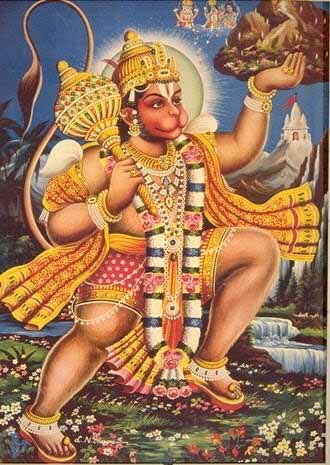 Sugreeva then narrated his own story to Rama. He was the king of Kishkindha where he had a wife named Tara. His brother Vali was serving him. One day he and his brother chased an invading asura who lead them to a mountain and entered a cave at its base. "I will go inside the cave and kill the asura. You wait here outside keeping guard to the entrance," Vali had said to Sugreeva. So Sugreeva waited outside while Vali fought the asura inside the cave. Time passed but Vali did not return. There was no sign of Vali’s fight with the asura in the cave either. The cave was silent. After about a year, Sugreeva decided that his brother must have been killed and that there was no point in waiting for him outside anymore. So he placed a large boulder at the entrance of the cave to cover it and went back to his city. But Vali was not dead. He had killed the asura after a long fight. When he tried to exit out of the cave he saw the boulder blocking the entrance. He pushed the boulder aside with great effort and reached Kishkindha where he saw Sugreeva enjoying the palace pleasures. He accused Sugreeva of intentionally trying to kill him by blocking the entrance to the cave. A fight erupted in which Vali defeated Sugreeva and drove him out of the city. He also kept Sugreeva’s wife for himself. Sugreeva had fled to the Rushyashringa mountain along with his key followers – Hanuman, Jambavanta and his son Angada. "I can help you search and rescue your wife, if you help me regain my kingdom," proposed Sugreeva to Rama. "Vali is powerful. I can not dream of defeating him in direct fight for he gets his strength from his opponents. Whoever fights with him looses a third of his strength and Vali becomes that much stronger. Therefore I need your help." Rama agreed and sent Sugreeva to challenge Vali to a fight. While they were fighting, Rama standing behind a tree shot an arrow from a distance and killed Vali. Rama then made Sugreeva the king of Kishkindha. Tara now became the queen of Sugreeva once again. As agreed, Sugreeva sent his army of apes in all directions to search for clues of whereabouts of Sita. In particular, he commissioned Hanuman to look for Sita in Lanka because that is where Ravana probably took her. Rama gave Hanuman the golden hair piece of Sita from the bundle of jewelry that she had dropped so Hanuman can identify himself as the messenger of Rama. Hanuman, along with some other apes, reached the sea shore but faced the problem of crossing the ocean to reach Lanka which was at about one hundred miles away from the shore. Hanuman is the son of the wind god and was a very strong and powerful ape. He also had the eight siddhis that only the perfect yogis possessed. With the help of these siddhis, taking the name of Rama, he jumped across the ocean and landed on the shore of Lanka. Hanuman searched for Sita all over the city of Lanka but could not locate her. He also entered the bedroom of Ravana in his palace and saw many ladies attending on Ravana or asleep but he could not be sure if Sita was among them because he had never seen her. He decided that Sita could not possibly be in Ravana’s bedroom. She would rather die than even so much as look at Ravana. So Hanuman continued his search and reached the Ashoka garden at the outskirts of the city. There under a tree he spotted a lady being cajoled by asura women to accept Ravana. Hanuman immediately concluded that the lady must be Sita. He waited patiently atop the tree and when the asura women were tired of harassing Sita and went back, he came down and identified himself to her by showing her the piece of jewelry. He further described how Rama and Lakshmana looked like. When she heard the description of physical appearance of Rama, she believed him. Hanuman conveyed to her the safety of her husband and his brother and that they would be coming soon to fetch her. Sita was very happy hearing about her beloved Rama ad Lakshmana. She gave him her ring to take back to Rama. She told Hanuman to convey to Rama her love. 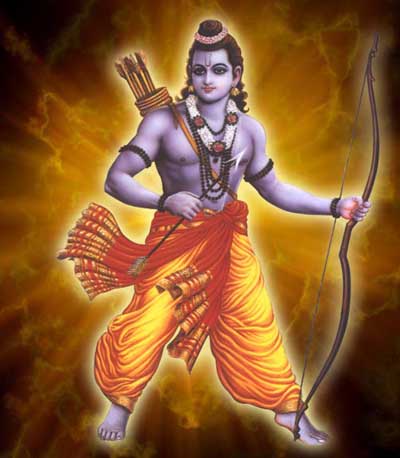 Rama mobilized the ape army of Sugreeva immediately and asked Hanuman, Jambavanta, Angada, and other powerful leaders to lead the army towards Lanka. But how are they going to get this large contingent of the army across the waters? Rama then ordered the god of the ocean to help Him build the bridge by letting the bridge float on water. The god of the ocean agreed and the bridge was built. The army crossed the ocean with ease and reached the shores of Lanka. Rama wanted to follow the accepted behavior for kings before they resorted to war. He has to send a messenger offering for negotiation. So he sent Angada to Ravana with the message that if Ravana returned Sita with all honor, Rama would spare him and there would be no need for war. Otherwise certain destruction was in store for Ravana. When Angada delivered the message to Ravana, he ridiculed both Angada and Rama and asked Angada to take the message back that he was ready to fight. Ravana’s brother Vibhishana was present when Angada’s message was delivered. He argued for accepting the overture of peace from Rama and advised Ravana to return Sita to Rama with full honor due to a queen. Ravana got angry with Vibhishana and drove him out of the city. Vibhishana left Ravana in disgust and approached Rama for protection. Rama not only gave him his protection but made him one of his close confidants. Angada’s mission thus foiled, both sides engaged in full scale war. Many were killed on both sides. Rama and Lakshmana killed all most all the lieutenants of Ravana who was left with only his son Indrajit and brother Kumbhakarna to fight for him. Kumbhakarna was an asura who ate excessively and slept rest of the time. He was a colossal figure and when he walked, he trampled ordinary humans under his feet. It was impossible to wake him up as it usually took bells, cymbals, trumpets and other instruments that made huge noise. Ravana woke him up and deployed him to fight the army of Rama. When he was awakened from his sleep, the asura was angry and hungry. He attacked Rama’s army with great vigor and killed most of the monkeys. The leaders of Rama’s army were afraid because they could not counter Kumbhakarna. But Lakshmana shot a powerful arrow and killed the asura. News of Kumbhakarna’s death has enraged Ravana. He loved his brother. Now he is dead. He immediately sent his son Indrajit to go and kill the two human princes. Indrajit was a ferocious fighter and had acquired many magic powers of war fare. He could fight by being invisible. He had many weapons of destruction in his possession. Taking his father’s orders he left for the battle field determined to kill Rama and Lakshmana. The first to fight him was Lakshmana. Both of them were extremely skillful in warfare. Every weapon that was hurled at him by Indrajit was countered by Lakshmana and vice versa. Finally, Indrajit used his magical weapon which would make Lakshmana faint. Lakshmana had no match for Indrajit’s weapon and he fainted. He would die by the morning if he is not awakened from his coma. Rama was confounded. He did not know what to do. Vibhishana advised him to send Hanuman to fetch the revivification herb from the Sanjeevani mountain. Hanuman immediately flew in the direction of Sanjeevani mountain and approached the glittering mountain but he did not know how to identify the herb. So he picked up the whole mountain on his strong shoulders and flew back to Rama. Rama revived his brother by administering him the medicine from the herb. Indrajit was of course not happy to hear the news. He engaged Lakshmana again in battle. Lakshmana fought Indrajit with increased vigor this time because now he was immune to the magic of Indrajit’s weapons. Indrajit noticed his enemy’s increased power and ineffectiveness of his magic against him. He also fought back with doubled fervor. In the end Lakshmana killed Indrajit with his powerful arrows. The entire army of Rama was happy at the news for it meant that there was no one but Ravana left to fight and he had to come out to fight them the next day. The great fight between Rama and Ravana ensued the next day. Ravana had ten heads and twenty arms and he had the boon from Parameshwara that he would not be killed by anyone. But the boon did not include protection from humans and apes because Ravana never asked Parameshwara for protection from them. He thought humans and apes are weak and he needed no special protection against them. Now he found himself facing a human king with ape army. They fought fiercely for several days. Rama did not have a chariot or a horse from where to fight but Ravana had a chariot and an expert charioteer. Indra, the king of gods noticed it and he gifted his chariot and his charioteer, Matali, to Rama. From inside the chariot, Rama was no longer an easy target for Ravana’s weapons. Rama had in his possession all the weapons that his guru Vashishtha had taught him as well as those granted by Vishwamitra. He used them all very effectively against Ravana’s immensely powerful weapons. But each time Rama shot an arrow and cut off one of Ravana’s heads, it miraculously re-attached itself to Ravana’s body. It was impossible to kill him as long as the secret to this miraculous power of him remained hidden. Vibhishana knew the secret to Ravana’s immortality. Ravana had the elixir of immortality, Amritam, hidden in his stomach. So unless he is shot in the abdomen and the secret vessel of the elixir broken, he will continue to live no matter how many times shot. Vibhishana divulged the secret to Rama in confidence. This time, Rama instead of aiming at Ravana’s heads, aimed his very powerful arrow at Ravana’s abdomen. The arrow pierced Ravana’s belly and broke the secret vessel of Amritam in his stomach. In pain and crying loudly, Ravana at once fell to the ground and died. The war was over. The gods were happy. They rained flowers on Rama. All the three worlds which were harassed by Ravana before felt relieved. All the celestials, Siddhas, Sadhyas, Kinneras, Khecharas and other celestial beings praised Rama profusely and expressed their joy at the killing of Ravana and his brother Kumbhakarna. These two brothers had been Hiranyaksha and Hiranya Kashyapa in their previous birth whom the Lord had killed by taking on the incarnations of Varaha and Nrisimha. Rama sent for Sita immediately. However, even though he knew she was faultless, he had to ask her to enter a fire to prove her innocence to satisfy all those assembled. If she were innocent, she would emerge out of the fire unharmed. Sita gladly entered the blazing fire. The god of fire brought Sita back from the flames and told Rama that he need not doubt Sita’s innocence because she is pure as fire itself. Rama received Sita with love and joy. Rama then made Vibhishana the king of Lanka. It was almost fourteen years since he had left Ayodhya; so it was time to return home since his word to stay in exile for fourteen years has been fulfilled. Vibhishana offered the Pushpaka airplane for Rama to fly back to Ayodhya. Rama accompanied by Sita, Lakshmana and Hanuman reached Ayodhya to the greatest welcome by the people there. Bharata gave his slippers back and asked him to be the king. Vashishtha then coronated Rama as the king of Ayodhya on an auspicious day. Rama ruled the earth for ten thousand years very morally. People in his rule always behaved morally and ethically. His reign has remained as an example to succeeding generations as Rama Rajya. |
|
|
Home |
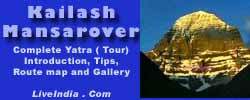 |
 |
 |
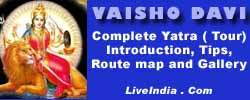 |
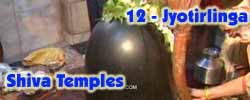 |
 |